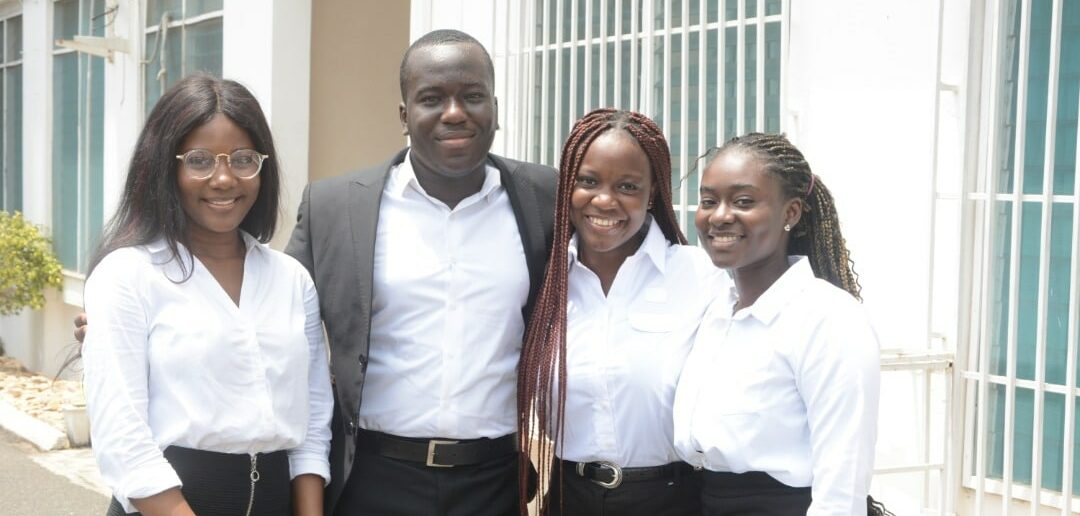Faculty of law
The Law Faculty in general is committed to training students into the legal profession. Students and faculty are encouraged to achieve the general targets of excellence and to make the GIMPA Law, the leading law faculty in the country through hard work, cooperation and commitment to the values of the Institute. Over the years, teaching and administrative staff of the Law Faculty have met regularly to discuss and debate issues pertaining to development of the Law Faculty and its departments, and to chart a path to promote their growth. This exercise, upon my assumption as Coordinator, Private law, resulted in the development of this strategic plan for the Department, which overall aims at promoting the Faculty as one of the lead institutions in the provision of legal education by leveraging the strength of the Department, its dynamic student corps, competent and dedicated faculty and as well as its committed administrative staff.

Head's Message
Mr Lom Nuku Ahlijah
Head, Department of Faculty of Law
As the head of the department, I am pleased to extend a warm welcome to all visitors to our faculty’s website. Here at the Faculty of Law, we have established a strong foundation through our strategic framework, which continues to guide our administration in achieving excellence. Our comprehensive 5-year strategic plan encompasses a broad range of thematic areas, each aimed at promoting education, nurturing an engaged community of academics and students, and fostering valuable international exchanges with leading law schools and partner institutions worldwide. We remain dedicated to pursuing administrative inclusivity and implementing various aspects of our strategic plan through dedicated school committees. Since the plan’s adoption, our management has evolved along the thematic lines outlined within, driving the sustained progress of the Faculty of Law thus far.
It is with great pride that we share the accomplishments of our students who have actively participated in exchange programs with renowned universities in the United States, including the prestigious Harvard Law School. Looking ahead, we are excited to encourage our students to leverage our partnerships with universities around the world, enabling them to embark on enriching exchange programs in diverse global settings.
Simultaneously, we are committed to facilitating the arrival of students and faculty from our partner universities, fostering a robust agenda of collaboration right here at GIMPA. Our dedication to internationalization remains unwavering, as evidenced by our continued collaborative engagements with esteemed institutions such as Fordham Law School and the World Bank. Furthermore, we take immense pride in our active participation in three prestigious international moot court competitions: the All African Moot Court, the ICC Moot Court, and the Philip Jessup Moot Court Competitions. These endeavors highlight our commitment to excellence and global recognition in the field of law.
In conclusion, I extend my heartfelt gratitude to the faculty members, staff, and students who have contributed to the success of the Faculty of Law. Together, we have built a vibrant community that values academic excellence and fosters an inclusive environment for growth and collaboration. Once again, I welcome you to the Faculty of Law. As you, I am pleased for you to discover the multitude of opportunities that await you here. Whether you are a prospective student, an esteemed colleague, or an interested visitor, we are excited to embark on this journey with you, shaping the future of legal education and scholarship.
Thank you for your visit.About the Department
The Law Faculty in general is committed to training students in the legal profession. Students and faculty are encouraged to achieve the general targets of excellence and to make the GIMPA Law, the leading law faculty in the country through hard work, cooperation and commitment to the values of the Institute. Over the years, teaching and administrative staff of the Law Faculty have met regularly to discuss and debate issues pertaining to the development of the Law Faculty and its departments and to chart a path to promote their growth. This exercise, upon my assumption as Coordinator, Private law, resulted in the development of this strategic plan for the Department, which overall aims at promoting the Faculty as one of the lead institutions in the provision of legal education by leveraging the strength of the Department, its dynamic student corps, competent and dedicated faculty and as well as its committed administrative staff.
The strategic plan responds to the significant needs of teaching the law in a modern competitive market by promoting best practices and innovation in legal education. As the legal academy in Ghana faces challenges that have led to heightened scrutiny and critique by the General Legal Council of Ghana and the National Accreditation Board, it was important to conceptualize and adopt a strategic plan to support the effective running of the Department and the Faculty as a whole.
The strategic plan demonstrates the Department’s commitment to preparing our students for higher academic achievements, organising the administrative staff into a dynamic managerial force and providing effective teaching through a fully competent teaching staff. Ultimately, the overriding objective is to ensure a smooth running and administration of the Department, and for the purpose of quality teaching, ensure proper course organization, content review, programme design and course allocation and the conduct of credible examinations. At the Department level, the primary focus was to overcome the various constraints that impede the delivery of quality lectures, conduct and quality of examinations, computation of grades and preparation of transcripts and to effectively address all the administrative issues relating to the day-to-day running of the Department and the Faculty in general. The Department’s strategic plan is a critical step towards accomplishing these goals, as we innovate in our teaching, assessment, course organization and the general professional development and growth of the teaching and administrative staff. The main expectation at the department level is to build a community of staff and students founded on academic excellence and geared towards building a strong alumni network to establish the pride of our student clientele in coming to GIMPA Law.
Areas of expertise
- International Law and Justice
- Constitutional Law
- International Criminal Law
- Intellectual Property Law
- Law and Ethics
- International Criminal Law/Criminal Law, Labour Law
- Human Rights, Jurisprudence
Academic Programmes
Undergraduate (Day & Evening)
Bachelor of Laws Degree (LL.B Day Stream)
This programme targets Senior High School (SHS) graduates, who are interested in studying law as a first degree. The requirements for admission are three (3) credit passes in three (3) core subjects and three (3) credit passes in three (3) elective subjects in the West African Senior School Certificate Examinations (WASSCE). The admission process is highly competitive and thus only few applicants are granted admission every year. The programme is for a duration of four (4) academic years and lectures are from 9am to 4pm whenever school is in session. The programme adequately prepares students for admission to the Ghana School of Law.
Bachelor of Laws Degree (LL.B Evening Stream)
This programme is designed for students who already possess a first degree in any discipline and are desirous of pursuing law as a post-first degree course. The minimum requirements for admission include a Bachelor’s Degree in any discipline from an approved University with a minimum of Second Class (Lower Division), or a professional chartered qualification such as ACCA, ICA, ICSA, CIPS and CIMA. The process of admission includes writing and passing a highly competitive entrance examination as well as successfully passing a rigorous qualifying interview. Only a limited number of qualified applicants are admitted every year. The programme adequately prepares students for admission to the Ghana School of Law.
Graduate Programmes
Master of Laws Degree (LL.M)
The GIMPA Faculty of Law recognises the need for diverse legal professionals with the requisite expertise in a globally competitive marketplace. We are therefore pleased to introduce our One (1) year Master of Laws Degree (LL.M) programme (General). This programme allows students to customise and design their studies to suit their needs by drawing from the diverse course offerings in our three (3) specialised areas, i.e. International Trade and Business Law; Dispute Resolution Law and Practice; and International Criminal Law and Justice. Ultimately, this programme is designed to ensure that students meet the knowledge and skill requirements for the award of this advanced degree in Law.
Admission Requirements Applicants for the LL.M programmes must have obtained at least a Second Class (lower division) in a Bachelor of Laws Degree (LL.B) programme. Applicants who obtained a Third Class in a Bachelor of Laws Degree (LL.B) programme, with relevant experience, may be admitted in exceptional cases and on a case-by-case basis. Duration and Graduation Requirements The LL.M (General) is a full-time programme. Progression through the programme and successful completion are based on passing all prescribed courses and dissertations. Students will, in normal circumstances, graduate within one year of admission to the Programme. In exceptional circumstances, students will be allowed to graduate within two years of admission to the programme if such extension is justified by extenuating circumstances. Students who successfully complete the programme requirements will be awarded the degree of Master of Laws Degree (LLM)International Criminal Law and Justice (LL.M)
International Criminal Law is a specialized discipline within the broader field of International Law i.e. it is a subset of Public International Law. It focuses on the various categories of international crimes and the institutions and processes that give meaning to the discipline. With cases of impunity for atrocity crimes (i.e. Genocide, Crimes Against Humanity, War Crimes and the Crime of Aggression) on the increase globally in our contemporary times, but especially within the context of Africa, it is imperative for African lawyers and other legal professionals to be conversant with the practical workings of the International Criminal Law and Justice regime. The GIMPA Faculty of Law recognizing the need for such legal professionals, is pleased to introduce its One (1) year Master of Laws Degree (LL.M) programme in International Criminal Law and Justice. This programme focuses on accountability for the commission of atrocity crimes and the role of Africa within the International Criminal Law and Justice architecture. The programme provides an in-depth appreciation of the various disciplines that come together to form the core of International Criminal Law i.e. International Human Rights Law and International Humanitarian Law. The International Criminal Court (ICC), the permanent court with the responsibility of administering justice within this field is also thoroughly examined, with the possibility of internship opportunities at the ICC available to students on the programme. Ultimately, this programme is designed to ensure that students meet the knowledge and skill requirements for the award of this specialized degree in Law.
Admission RequirementsApplicants for the LL.M programmes must have obtained at least a Second Class (lower division) in a Bachelor of Laws Degree (LL.B) programme. Applicants who obtained a Third Class in a Bachelor of Laws Degree (LL.B) programme, with relevant experience, may be admitted in exceptional cases and on a case-by-case basis.
Duration and Graduation RequirementsThe LL.M. in International Criminal Law and Justice is a full-time programme. Progression through the programme and successful completion are based on passing all prescribed courses and a dissertation. Students will, in normal circumstances, graduate within one year of admission to the Programme. In exceptional circumstances, students will be allowed to graduate within two years of admission to the Programme if extenuating circumstances justify such an extension. Students who successfully complete the programme requirements will be awarded the Master of Laws Degree (LLM) with a specialization in International Criminal Law and Justice.
International Trade and Business Law (LL.M)
The commencement of the African Continental Free Trade Area (AfCFTA) in January 2021, signified the creation of the world’s largest free trade area with the aim of attaining a single continental market in Africa to boost intra-African trade, whilst eliminating trade barriers. As one of the flagship projects of the African Union’s ‘Agenda 2063: The Africa We Want’, the aim of the AfCFTA is to enable the free flow of goods and services across the continent and boost the trading position of Africa in the global market. The AfCFTA therefore presents an opportunity for a diverse field of professionals, who can leverage on the potential and promise of a new Africa where systemic poverty is gradually eliminated. The GIMPA Faculty of Law recognizing the need for such a diverse body of professionals, is pleased to introduce its One (1) year Master of Laws Degree (LL.M) programme in International Trade and Business Law. This is a specialized area of law that focuses on transnational trade generally and the legal regime within which it operates. Specific attention is however given to regional economic integration in Africa, and the role of the AfCFTA in transforming the continent into a powerhouse in trade and business generally. The programme is further designed to ensure that students meet the knowledge and skill requirements for the award of this specialized degree in Law.
Admission RequirementsApplicants for the LLM programmes must have obtained at least a Second Class (lower division) in a Bachelor of Laws Degree (LL.B.) programme. Applicants who obtained a Third Class in a Bachelor of Laws Degree (LL.B) programme, with relevant experience, may be admitted in exceptional cases and on a case-by-case basis.
Duration and Graduation RequirementsThe LLM in International Trade and Business Law Programme is a full-time programme. Progression through the programme and successful completion are based on passing all prescribed courses and dissertations. Students will, in normal circumstances, graduate within one year of admission to the Programme. In exceptional circumstances, students will be allowed to graduate within two years of admission to the Programme if such extension is justified by extenuating circumstances. Students who successfully complete the programme requirements will be awarded the degree of Master of Laws Degree (LLM) with a specialization in International Trade and Business Law.
Dispute Resolution Law and Practice (LL.M)
Increasingly, alternative forms of dispute resolution are becoming more attractive, less expensive and more effective than litigation. The very fact that an overwhelming majority of international and transnational commercial transactions and agreements, for instance, incorporate and rely on these alternative forms of dispute resolution is a testament to their efficacy. With the proliferation of multi-national companies operating in Africa in various areas of commerce and the continent emerging as a hub for foreign direct investments, there is an urgent need for legal professionals, who are experts in cross-border dispute resolution. The GIMPA Faculty of Law recognizing the need for such legal professionals, is pleased to introduce its One (1) year Master of Laws Degree (LL.M) programme in Dispute Resolution Law and Practice. This programme provides an in-depth appreciation of dispute resolution law, in both its theoretical and practical forms. It is designed to prepare students for a career in crossborder dispute resolution and become effective practitioners in the field. The programme is further designed to ensure that students meet the knowledge and skill requirements for the award of this specialized degree in Law.
Admission RequirementsApplicants for the LL.M programmes must have obtained at least a Second Class (lower division) in a Bachelor of Laws Degree (LL.B) programme. Applicants who obtained a Third Class in a Bachelor of Laws Degree (LL.B) programme, with relevant experience, may be admitted in exceptional cases and on a case-by-case basis.
Duration and Graduation RequirementsThe LL.M. in Dispute Resolution Law and Practice is a full-time programme. Progression through the programme and successful completion are based on passing all prescribed courses and dissertations. Students will, in normal circumstances, graduate within one year of admission to the Programme. In exceptional circumstances, students will be allowed to graduate within two years of admission to the Programme if extenuating circumstances justify such an extension. Students who successfully complete the programme requirements will be awarded the Master of Laws Degree (LLM) with a specialization in Dispute Resolution Law and Practice.
Research Component
Long Essay/Moot Court
Practical Training, Industrial Attachment, Internship, Clinical Experience, Etc., There are Internship and Externship opportunities in respect of the LL. B-Day programme. The Law and Ethics Seminar and Law Reporting in Ghana both have internship components in the second semester (3 credit hours each), where students would be required to undertake internships/externships with the Superior Courts of Ghana, selected private law firms, selected legal departments of corporate entities and the Council for Law Reporting.
Structure of The Programme
Semester-by-semester schedule/structure of the course, showing the credit value of each course. The courses designated as ‘core’ are those required by the General Legal Council as prerequisites for entry into the professional programme at the Ghana School of Law.
Changes in Curriculum/Delivery
Evening Programme
- Administrative Law has been designated as a Core subject to be taught in one semester in the first year.
- Human Rights Law is now available as one of two electives available in the second year.
- International Criminal Law has been introduced for the first time as one of two electives available in the second year.
- Intellectual Property Law is now available as one of four electives, alongside Tax and Revenue Law, Conflict of Laws and International Trade and Investment Law, available in the final year.
Day Programme
- Administrative Law and Human Rights Law are designated to be available in the second year.
- International Criminal Law and Law and Ethics Seminar have been introduced as electives in the second year and third year respectively of the LL. B (Day). Programme.
- The second semester of the Law and Ethics Seminar will consist of an attachment/internship/externship with Justices of the Superior Court of Judicature, Law Firms and Legal Departments of selected Companies.
- Law Reporting in Ghana has been introduced for the first time as an elective subject in the second year; with the second semester dedicated to practical attachments for students at the Council for Law Reporting
- Law and Technology has also been introduced as an elective subject in the third year.
Moot Courts and competitions
The law school has during the period of my stewardship continued to participate in the major regional and global competitions including the Philip Jessup, All Africa Moot, and the ICC moot court competitions. For the past six years (save this year), the law school participated in all three (3) competitions and projected the image and standing of the law school. I am proud to announce that in the 2018 edition which was recently hosted by the University of Ghana, GIMPA was shortlisted among the top 15 teams of the competition in Africa and the memorials presented by the GIMPA team were adjudged among the best 5 in the competition.
The team participated in the All Africa Human Rights in Cairo, Egypt in July 2022. And also the Team participated in the IBA ICC Moot Court Competition 2023 in Hague, The Netherlands and won the Best Regional Team of Africa. The law school established two important centres during the period under review namely, the African Center for International Criminal Justice (ACICJ) and the African Center for Legal Ethics (ACLE). The two centers have been fully self-financing and have to date not received any funding/administrative support from GIMPA. In spite of this, the Centers have together organized at least 8 different training events for participants from Ghana and across Africa with the most recent bringing together 24 trainees from 6 different African countries.GIMPA Law Review
The publication of the GIMPA Law Review is in its third year and the publication of the 4th issue is well underway. Over the years, GLRev has published some excellent academic materials authored by both faculty members and other legal academics in and outside of Ghana. To ensure that the journal is reputable, GLRev has assembled some of the most distinguished and outstanding legal academics on its editorial board and the journal maintains a strict code of editorial review. The rigor of the assessment has resulted in the rejection of many submissions.
Internationalization
A strong push was made for the enhancement of the international presence of the law school and accordingly a number of exchanges and collaborative agreements including the establishment of collaborations with the universities of Newcastle, Australia, Sao Paulo, and Milan. Moving forward, we need to intensify these collaborations and networks given their strategic advantage in promoting the image and the standing of the school the world over.
Our Faculty

















Admissions
With over 3,000 students enrolled in six schools for undergraduate and graduate studies, prospective student interest continues to rise.
Want to Study at GIMPA?
- Check our admission requirements to see if you are eligible
- The minimum requirements for the Evening Programme are:
- a) First degree in any field with at least a third class. An applicant will have to sit an entrance examination and be subjected to an interview process.
- Day Programme: The minimum requirements for admission are
- a) A WASSCE certificate or its equivalent with credits in English, Mathematics and Integrated Science.
- AND Aggregate 14 in the West Africa Senior Secondary School Examinations (WASSCE).
Frequently Asked Questions
Where can I get application forms?
Dial *924*200*16# to purchase an e-voucher using Mobile Money. Alternatively, you can visit any Consolidated Bank Ghana (CBG) or Ecobank branch across the country. After acquiring the e-voucher, proceed to apply online at https://apply.gimpa.edu.gh/
How much is the application fee?
Application forms are going for
Post First Degree Law (LLB) GHC 350
Masters/Postgraduate Diploma - GHC 250
Bachelors (including WASSCE LLB)/Diploma –GHC 200
International Students- USD 100
What number can I call for enquiries?
What is the duration of your degree programmes?
NEWS STAND
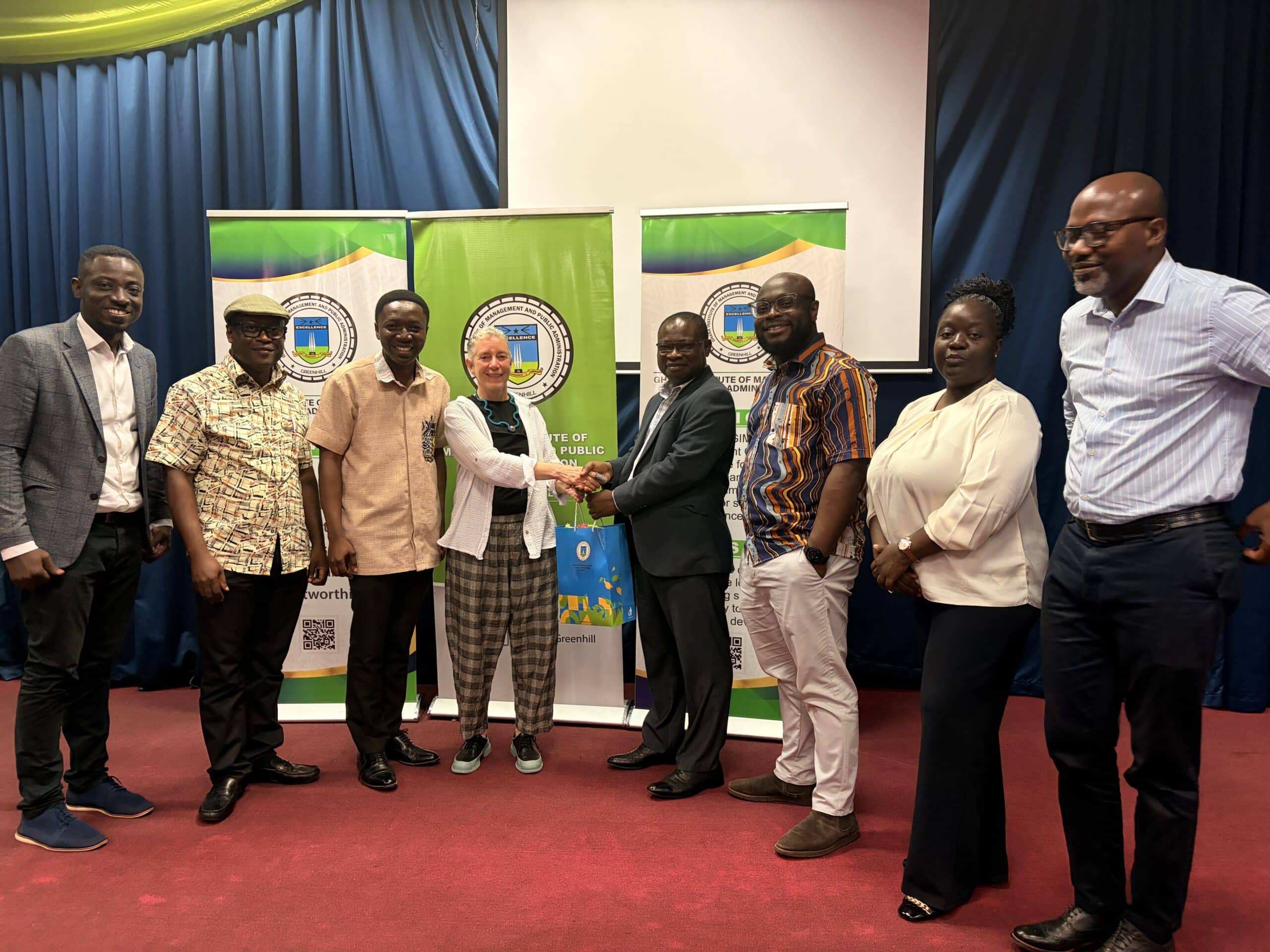
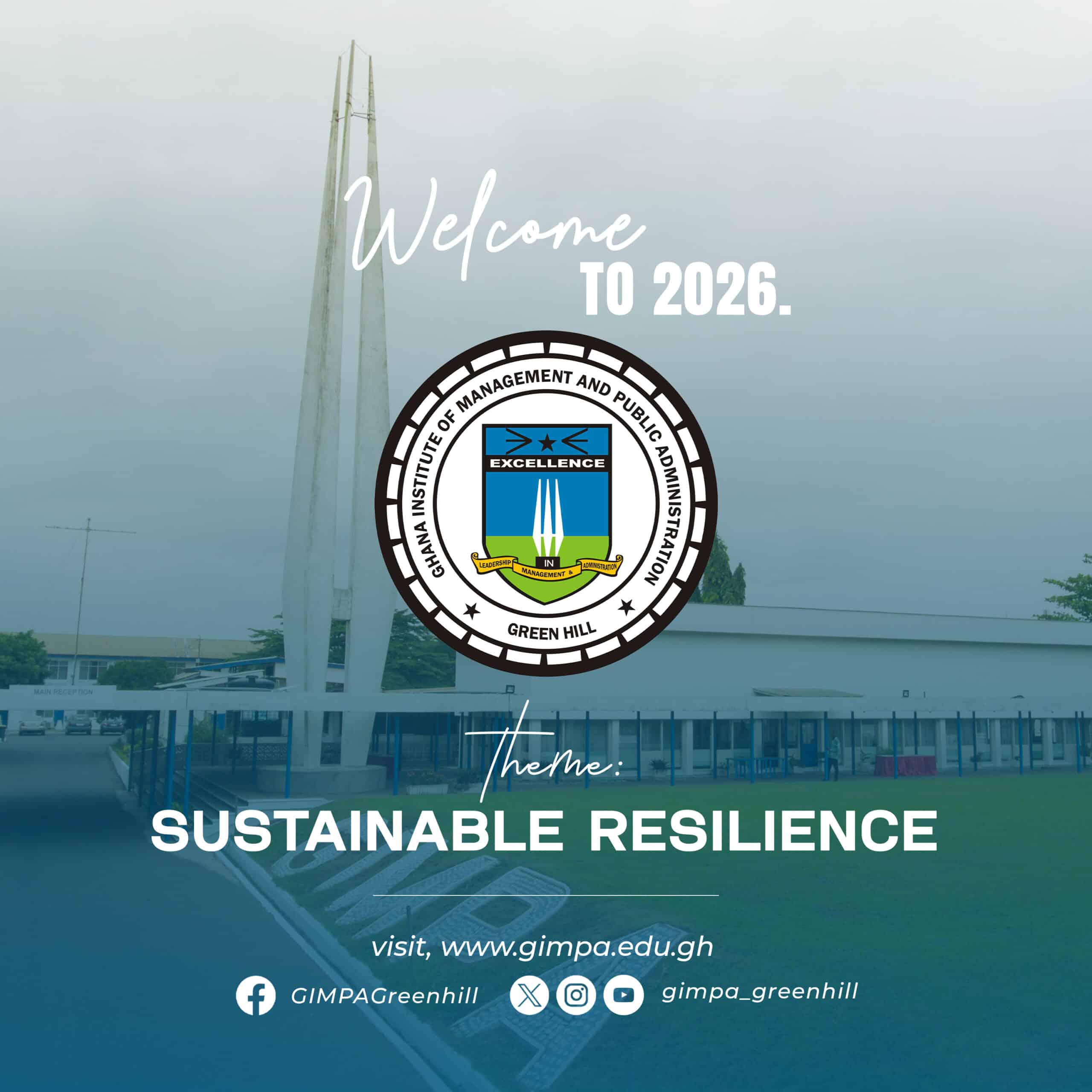
New Year Message from Prof. Samuel K. Bonsu, Rector of GIMPA
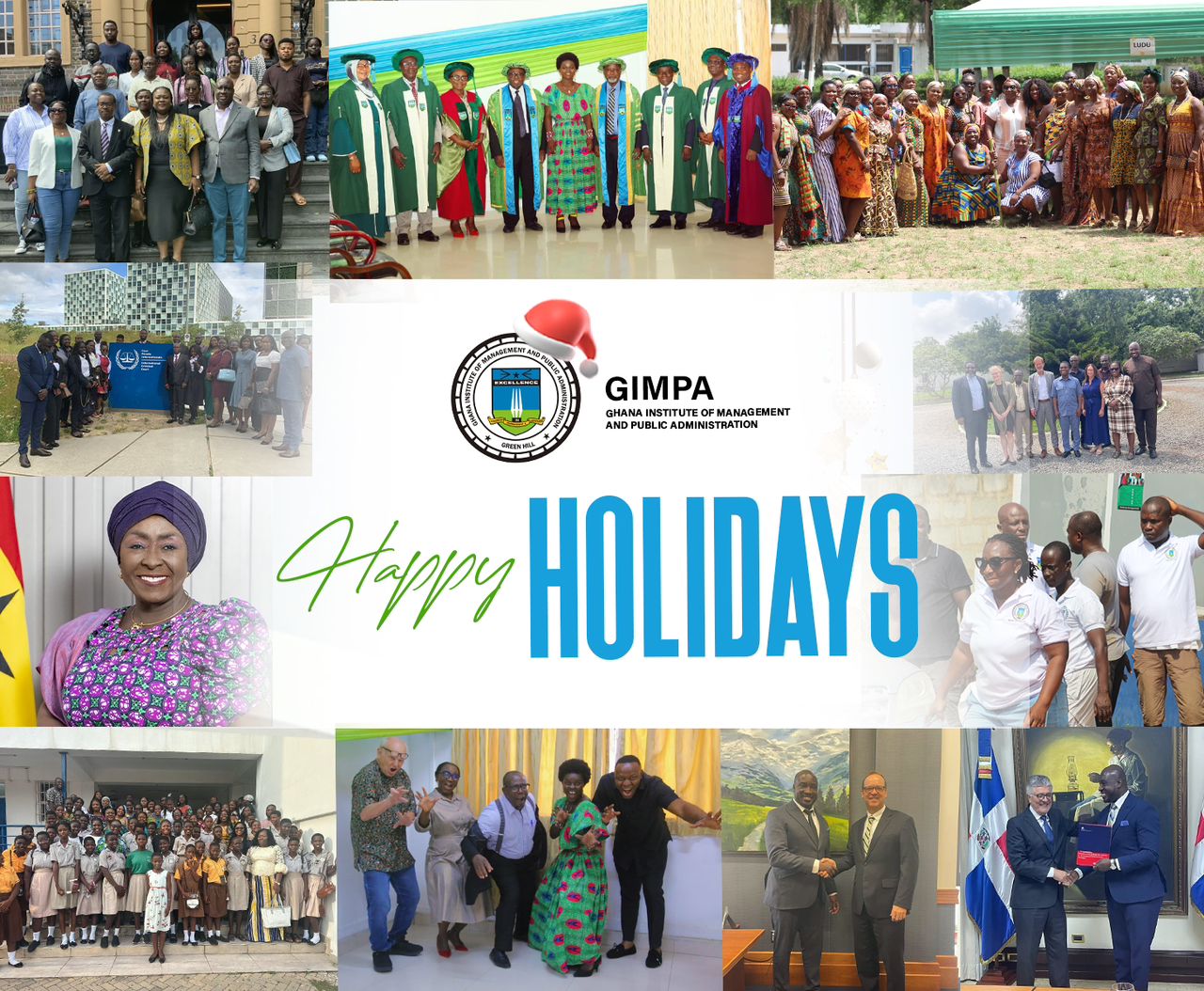
Christmas Message from Prof Samuel K. Bonsu, Rector of GIMPA
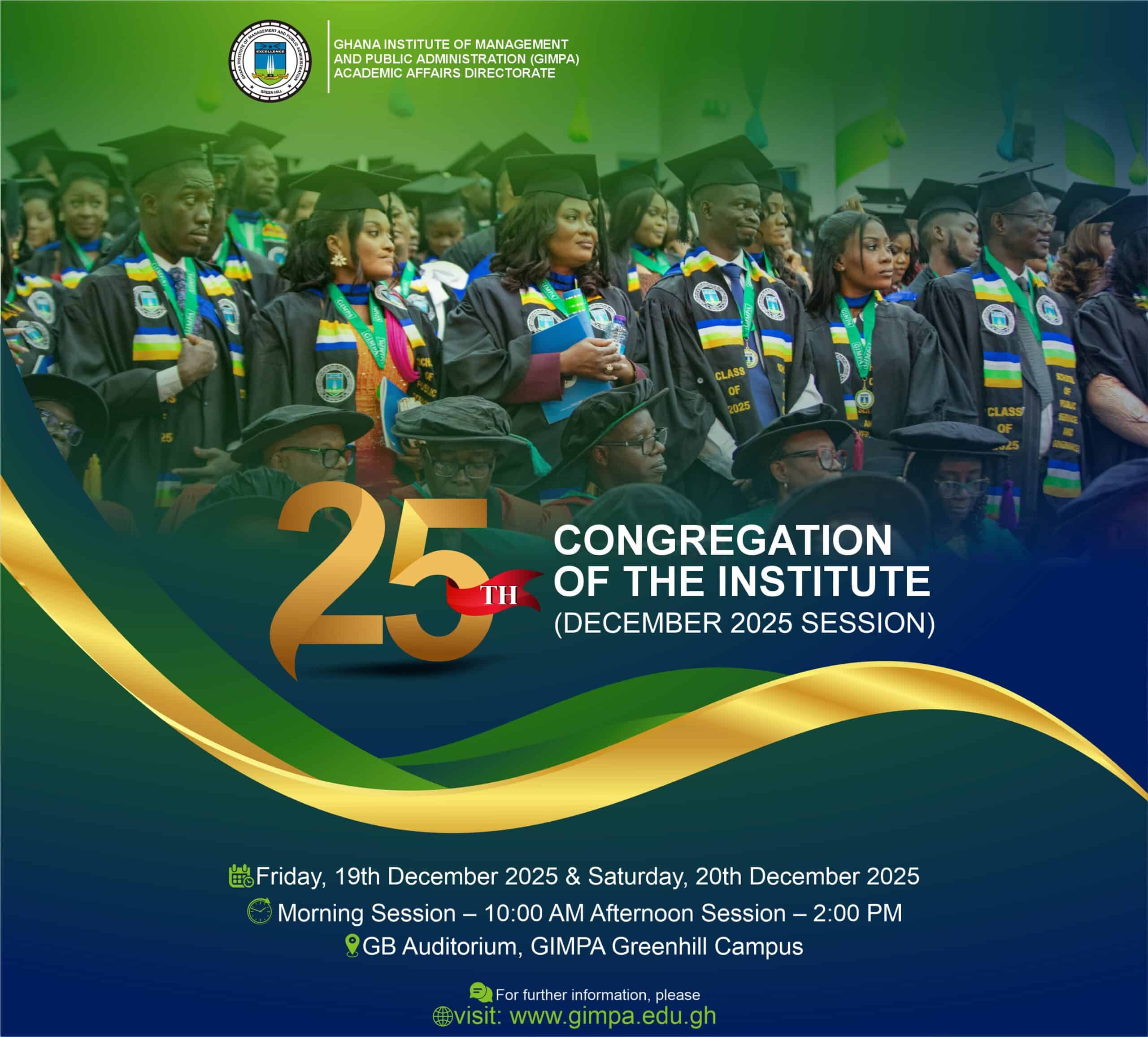
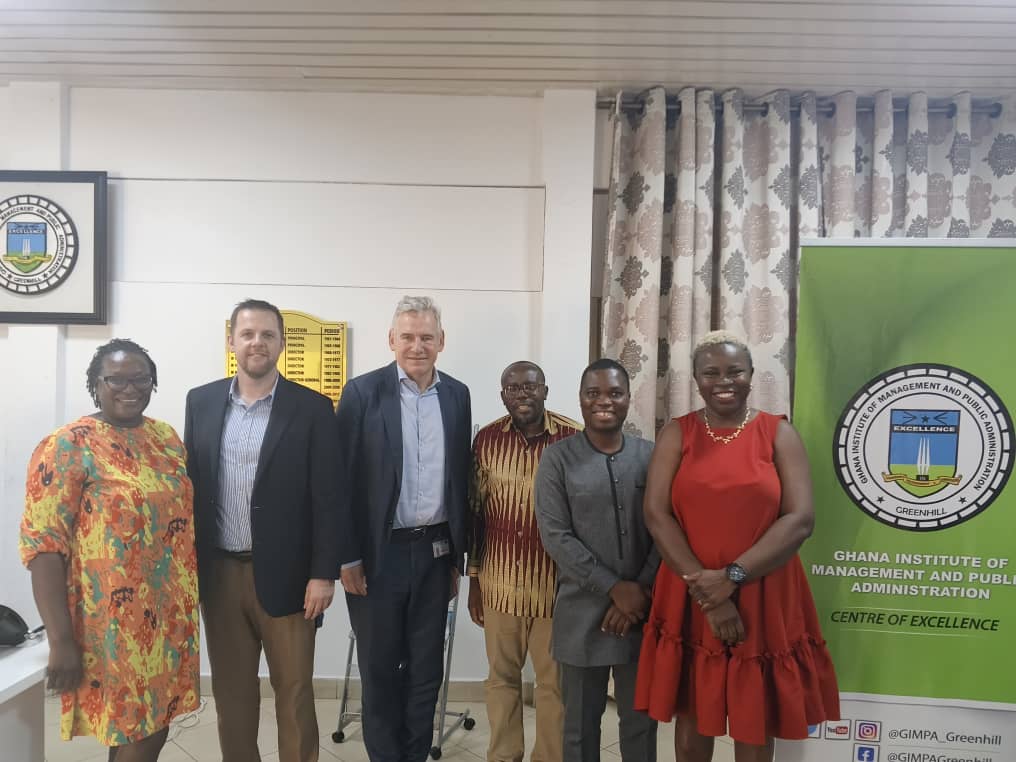
The EU Visit


New Year Message from Prof. Samuel K. Bonsu, Rector of GIMPA

Christmas Message from Prof Samuel K. Bonsu, Rector of GIMPA
Get the latest new right in your inbox.
Contact Us
Get In Touch
Looking forward to shaping your future? Reach out to us! We’re here to assist in your academic journey and beyond. Let’s connect and start your pathway to success today!
Open Hours
Mon – Fri : 8:30 – 18:00 GMT
Phone number
0242151930 Whatsapp: 0242151930/0249480306
Our Location
GIMPA Faculty of Law Building
Our Email
gls@gimpa.edu.gh


